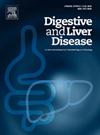Liver transplantation for colorectal metastases: impact of a standardized protocol on transplant outcomes
IF 3.8
3区 医学
Q1 GASTROENTEROLOGY & HEPATOLOGY
引用次数: 0
Abstract
Background
Liver transplantation (LT) has recently re-emerged as a viable treatment option for selected patients with unresectable colorectal liver metastases (uCRLM), with promising survival outcomes demonstrated in prospective studies such as SECA II. Identification of the right patients, however, may be essential for long-term cancer control. In April 2021, we introduced the LITORALE protocol, a multidisciplinary selection algorithm aiming to define strict eligibility criteria for LT in this setting. This study evaluates the impact of the LITORALE protocol on clinical outcomes and patterns of recurrence in a single high-volume transplant center.
Methods
We conducted a prospective observational study including 21 patients who underwent LT for uCRLM between July 2015 and September 2024. Patients were stratified into two groups: pre-LITORALE (n = 8) and LITORALE (n = 13), based on the introduction of the protocol. Demographic, tumor, transplant, and post-transplant data were analyzed, with a particular focus on overall survival (OS) and recurrence patterns.
Results
Following introduction of the LITORALE protocol, transplanted patients showed significantly reduced tumor burden at the time of LT, with fewer metastases (median 4 vs. 17.5, p = 0.004) and a lower Tumor Burden Score (6.32 vs. 18.02, p = 0.002). Notably, one- and three-year OS in the LITORALE cohort were 100% and 83%, respectively, comparable to SECA II trial. While overall recurrence incidence was lower in the LITORALE group (46.2% vs. 87.5%), a significant shift in recurrence pattern was observed: multi-site relapses were drastically reduced (7.7% vs. 50%, p = 0.048), and lung-only recurrences became predominant (50% vs. 0%, p = 0.033). These lung-limited relapses are considered more favorable and manageable as described by Norwegian group.
Conclusions
The LITORALE protocol standardized and made the selection of candidates for LT more stringent. This was followed by comparable survival rates to those in SECA II and a trend towards more treatable recurrence patterns. Recurrences that are limited to the lungs are a best-case situation for treatment since they can be resected or addressed with other therapies. These results highlight the importance of careful, multidisciplinary-based evaluation to improve liver transplant outcomes in patients with uCRLM and validate the application of programs like LITORALE in cancer transplantation.
肝移植治疗结直肠癌转移:标准化方案对移植结果的影响
背景:肝移植(LT)最近重新成为不可切除的结直肠肝转移(uCRLM)患者的可行治疗选择,在前瞻性研究(如SECA II)中证明了良好的生存结果。然而,确定合适的患者可能对癌症的长期控制至关重要。2021年4月,我们引入了LITORALE协议,这是一种多学科选择算法,旨在为这种情况下的LT定义严格的资格标准。本研究评估了LITORALE方案对单个大容量移植中心的临床结果和复发模式的影响。方法:我们进行了一项前瞻性观察研究,包括21例2015年7月至2024年9月期间因uCRLM接受肝移植的患者。根据方案的介绍,将患者分为两组:pre-LITORALE (n = 8)和LITORALE (n = 13)。分析了人口统计学、肿瘤、移植和移植后的数据,特别关注总生存期(OS)和复发模式。结果引入LITORALE方案后,移植患者在LT时的肿瘤负担显著减轻,转移灶减少(中位数4比17.5,p = 0.004),肿瘤负担评分降低(中位数为6.32比18.02,p = 0.002)。值得注意的是,LITORALE队列的1年和3年OS分别为100%和83%,与SECA II试验相当。虽然LITORALE组的总复发率较低(46.2% vs. 87.5%),但复发模式发生了显著变化:多部位复发显著减少(7.7% vs. 50%, p = 0.048),仅肺部复发占主导地位(50% vs. 0%, p = 0.033)。这些肺受限的复发被认为是更有利的和可控的,如挪威组所描述的。结论LITORALE方案标准化,使LT候选人的选择更加严格。随后的生存率与SECA II相当,并且有更可治疗的复发模式的趋势。局限于肺部的复发是最好的治疗情况,因为它们可以被切除或用其他疗法解决。这些结果强调了仔细的、基于多学科的评估对于改善uCRLM患者肝移植结果的重要性,并验证了LITORALE等项目在癌症移植中的应用。
本文章由计算机程序翻译,如有差异,请以英文原文为准。
求助全文
约1分钟内获得全文
求助全文
来源期刊

Digestive and Liver Disease
医学-胃肠肝病学
CiteScore
6.10
自引率
2.20%
发文量
632
审稿时长
19 days
期刊介绍:
Digestive and Liver Disease is an international journal of Gastroenterology and Hepatology. It is the official journal of Italian Association for the Study of the Liver (AISF); Italian Association for the Study of the Pancreas (AISP); Italian Association for Digestive Endoscopy (SIED); Italian Association for Hospital Gastroenterologists and Digestive Endoscopists (AIGO); Italian Society of Gastroenterology (SIGE); Italian Society of Pediatric Gastroenterology and Hepatology (SIGENP) and Italian Group for the Study of Inflammatory Bowel Disease (IG-IBD).
Digestive and Liver Disease publishes papers on basic and clinical research in the field of gastroenterology and hepatology.
Contributions consist of:
Original Papers
Correspondence to the Editor
Editorials, Reviews and Special Articles
Progress Reports
Image of the Month
Congress Proceedings
Symposia and Mini-symposia.
 求助内容:
求助内容: 应助结果提醒方式:
应助结果提醒方式:


